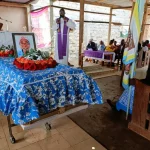The return to school for 24 students at Sacred Heart Mukumu Girls High School in Kakamega County quickly turned into a nightmare.
On May 8, these students reported feeling unwell, prompting their hospital admission.
County Health Executive Bernard Wesonga provided an update on their condition, revealing that two of the students are receiving treatment at Kakamega County Referral Hospital, while 22 others are being treated at St. Elizabeth Mission Hospital in Mukumu. Another 38 students have been referred to outpatient care in the two medical facilities.
The situation has left the entire community on edge, and concerns are mounting about the cause of the students’ illness.
According to the report, 82 students were admitted to various hospitals between May 8 and may 14 after reporting back to school and complaining of feeling unwell.
Two students were admitted to Kakamega County Referral Hospital and 41 to St Elizabeth Mission Hospital Mukumu.
One student was admitted to Hema Hospital in Kisii County.
The report differs sharply from a briefing given to journalists at the school on May 8 by the school’s principal, Sr Jane Mmbone, who claimed that only three students had reported back for studies feeling unwell.
Sr Mmbone said the three learners had been admitted to hospital with malaria symptoms and had been discharged after treatment.
According to the report, laboratory results from 44 students admitted for treatment showed that 16 had malaria.
Six students were found to be suffering from gastritis (inflammation of the lining of the stomach, forming an ulcer or sore) and peptic ulcer disease.
Four other students had acute gastroenteritis (a condition that causes diarrhoea and vomiting. A bacterial or viral stomach bug causes the condition.
Three other students had pneumonia, while 2 had sepsis (usually a life-threatening complication of infection). Five students were diagnosed with urinary tract infections, one with anaemia and two with brucellosis.
Two students had salmonellosis and three others had tonsillitis, syncope and leptospirosis.
According to the report: “Further laboratory culture tests are being carried out to rule out other possible pathogens. Most of the girls are in a stable condition and none of them have shown signs of severe illness such as severe dehydration, haemochezia, haematuria, jaundice, severe anaemia or persistent fever”.
Teams from the Kenya Red Cross, the Kenya Association of Counsellors and Masinde Muliro University of Science and Technology are providing psychosocial support to students, teachers and non-teaching staff at the school.



